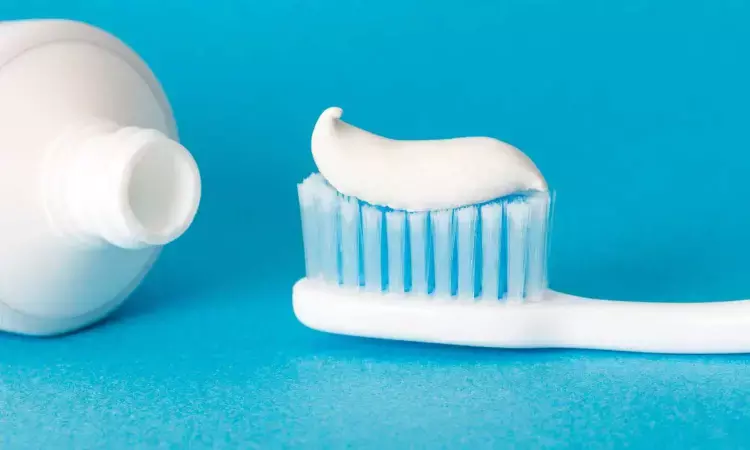- Home
- Medical news & Guidelines
- Anesthesiology
- Cardiology and CTVS
- Critical Care
- Dentistry
- Dermatology
- Diabetes and Endocrinology
- ENT
- Gastroenterology
- Medicine
- Nephrology
- Neurology
- Obstretics-Gynaecology
- Oncology
- Ophthalmology
- Orthopaedics
- Pediatrics-Neonatology
- Psychiatry
- Pulmonology
- Radiology
- Surgery
- Urology
- Laboratory Medicine
- Diet
- Nursing
- Paramedical
- Physiotherapy
- Health news
- Fact Check
- Bone Health Fact Check
- Brain Health Fact Check
- Cancer Related Fact Check
- Child Care Fact Check
- Dental and oral health fact check
- Diabetes and metabolic health fact check
- Diet and Nutrition Fact Check
- Eye and ENT Care Fact Check
- Fitness fact check
- Gut health fact check
- Heart health fact check
- Kidney health fact check
- Medical education fact check
- Men's health fact check
- Respiratory fact check
- Skin and hair care fact check
- Vaccine and Immunization fact check
- Women's health fact check
- AYUSH
- State News
- Andaman and Nicobar Islands
- Andhra Pradesh
- Arunachal Pradesh
- Assam
- Bihar
- Chandigarh
- Chattisgarh
- Dadra and Nagar Haveli
- Daman and Diu
- Delhi
- Goa
- Gujarat
- Haryana
- Himachal Pradesh
- Jammu & Kashmir
- Jharkhand
- Karnataka
- Kerala
- Ladakh
- Lakshadweep
- Madhya Pradesh
- Maharashtra
- Manipur
- Meghalaya
- Mizoram
- Nagaland
- Odisha
- Puducherry
- Punjab
- Rajasthan
- Sikkim
- Tamil Nadu
- Telangana
- Tripura
- Uttar Pradesh
- Uttrakhand
- West Bengal
- Medical Education
- Industry
Whitening Toothpaste May Worsen Dental Erosion, While Fluoride and Nano-HAP Offer Protection: Study Finds

Turkey: A new in vitro study has shed light on how various types of toothpaste impact enamel and dentine, with implications for the prevention and management of erosive toothwear. Researchers investigated whitening, fluoride-containing, and fluoride-free toothpastes, revealing key differences in their effects on dental surfaces.
The study, published in BMC Oral Health, revealed that whitening toothpastes can exacerbate dental erosion by increasing the surface roughness of enamel and dentine. In contrast, the protective efficacy of fluoride-free toothpastes was found to vary significantly depending on their active ingredients, with some formulations offering minimal protection against erosive damage.
The global rise in erosion lesions has driven researchers to explore effective toothpaste formulations capable of protecting tooth surfaces from acid attacks. Despite extensive efforts, there is no clear consensus on which toothpaste ingredients offer the best defense against erosive toothwear. This ongoing uncertainty underscores the need for further studies in this area. To address this gap, researchers from Turkey, Betül Kübra Kurucu Karadeniz & Emel Karaman, set out to assess the preventive effects of toothpastes with various active ingredients on enamel and dentine erosion.
For this purpose, the researchers used ninety recently extracted bovine incisors, separating the crowns and roots and grinding them flat to prepare enamel and dentine surfaces. The specimens were then divided into six groups: Curaprox Enzycal Zero Fluoride (fluoride-free), Colgate Total 12 (1450 ppm NaF), Splat Biocalcium (fluoride-free and Nano-HAP), Colgate ProRelief (1450 ppm NaF and arginine), Sensodyne Repair and Protection (1450 ppm NaF and novamin), and Opalescence Whitening (1100 ppm NaF).
Each specimen was exposed to a demineralizing solution for 2 minutes and artificial saliva for 60 minutes, repeated four times daily over five days. Brushing was performed with a charged toothbrush at the start and end of the erosive cycles. Initial and final surface roughness was measured on the fifth day using a 3D profilometer, with comparisons made using the Wilcoxon test to identify changes in roughness levels following treatment.
The following were the key findings of the study:
- Opalescence Whitening and Curaprox Enzycal Zero Fluoride significantly increased surface roughness in both enamel and dentine compared to baseline.
- These groups exhibited rougher surfaces than all other groups, except for Colgate ProRelief.
- Sensodyne Repair and Protection resulted in the smoothest enamel surfaces.
- Colgate Total 12 led to the smoothest dentine surfaces.
- Enamel samples in the Opalescence Whitening group showed a significantly greater increase in surface roughness compared to dentine samples.
Within the limitations of this in vitro study, the authors concluded that whitening toothpastes increased both enamel and dentine surface roughness, with enamel roughness being significantly greater than dentine roughness in response to whitening toothpastes. Toothpastes containing fluoride, fluoride combined with novamine, and fluoride combined with arginine were effective in dental erosion prevention. The protective effects of fluoride-free toothpastes varied depending on their specific active ingredients.
"Additionally, toothpastes containing Nano-HAP demonstrated potential in preventing erosive tooth wear (ETW) even without fluoride, though fluoride remains the most effective and reliable option. Nano-HAP toothpastes may serve as an alternative for patients who cannot or choose not to use fluoride" the researchers wrote.
Reference:
Karadeniz, B.K.K., Karaman, E. Effects of different toothpastes against erosive tooth wear of enamel and dentine in vitro. BMC Oral Health 24, 1471 (2024). https://doi.org/10.1186/s12903-024-05260-z
Dr Kamal Kant Kohli-MBBS, DTCD- a chest specialist with more than 30 years of practice and a flair for writing clinical articles, Dr Kamal Kant Kohli joined Medical Dialogues as a Chief Editor of Medical News. Besides writing articles, as an editor, he proofreads and verifies all the medical content published on Medical Dialogues including those coming from journals, studies,medical conferences,guidelines etc. Email: drkohli@medicaldialogues.in. Contact no. 011-43720751


